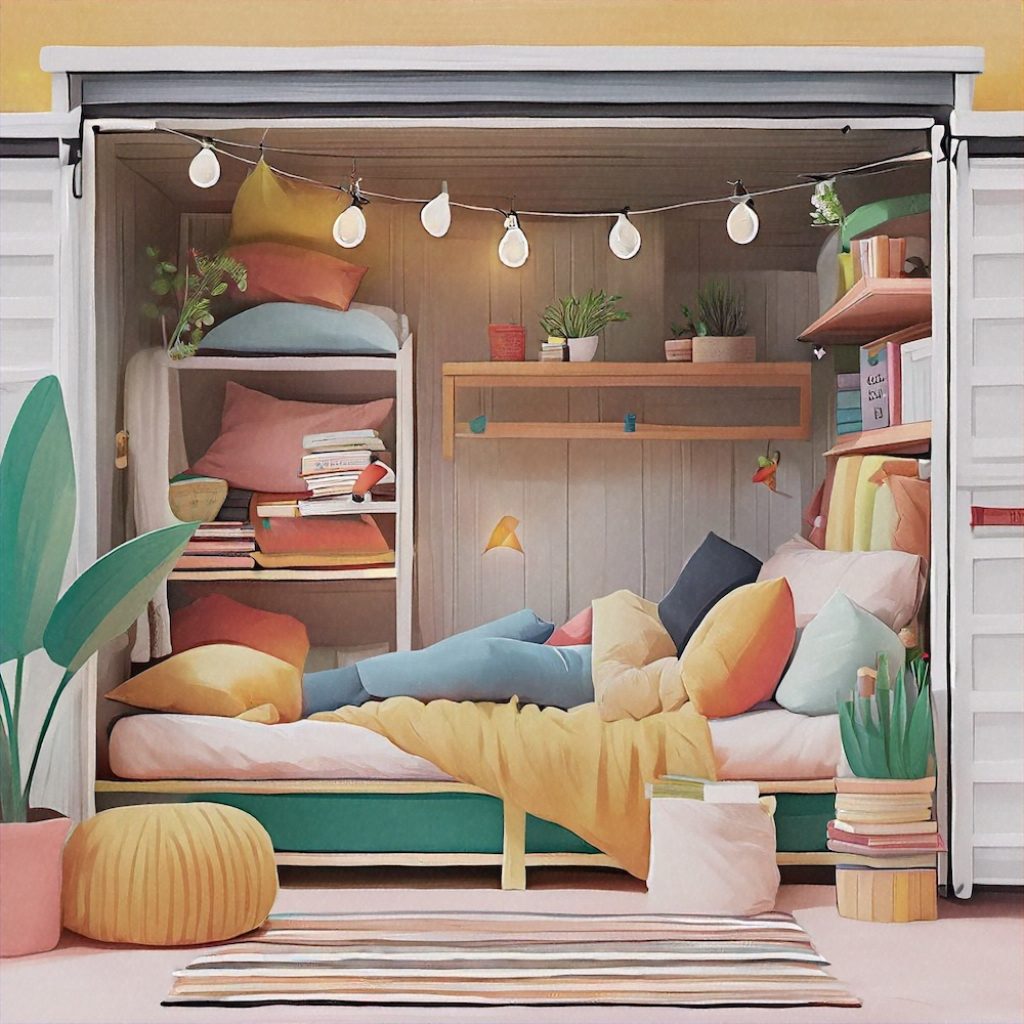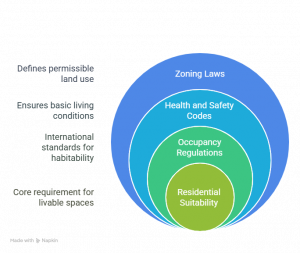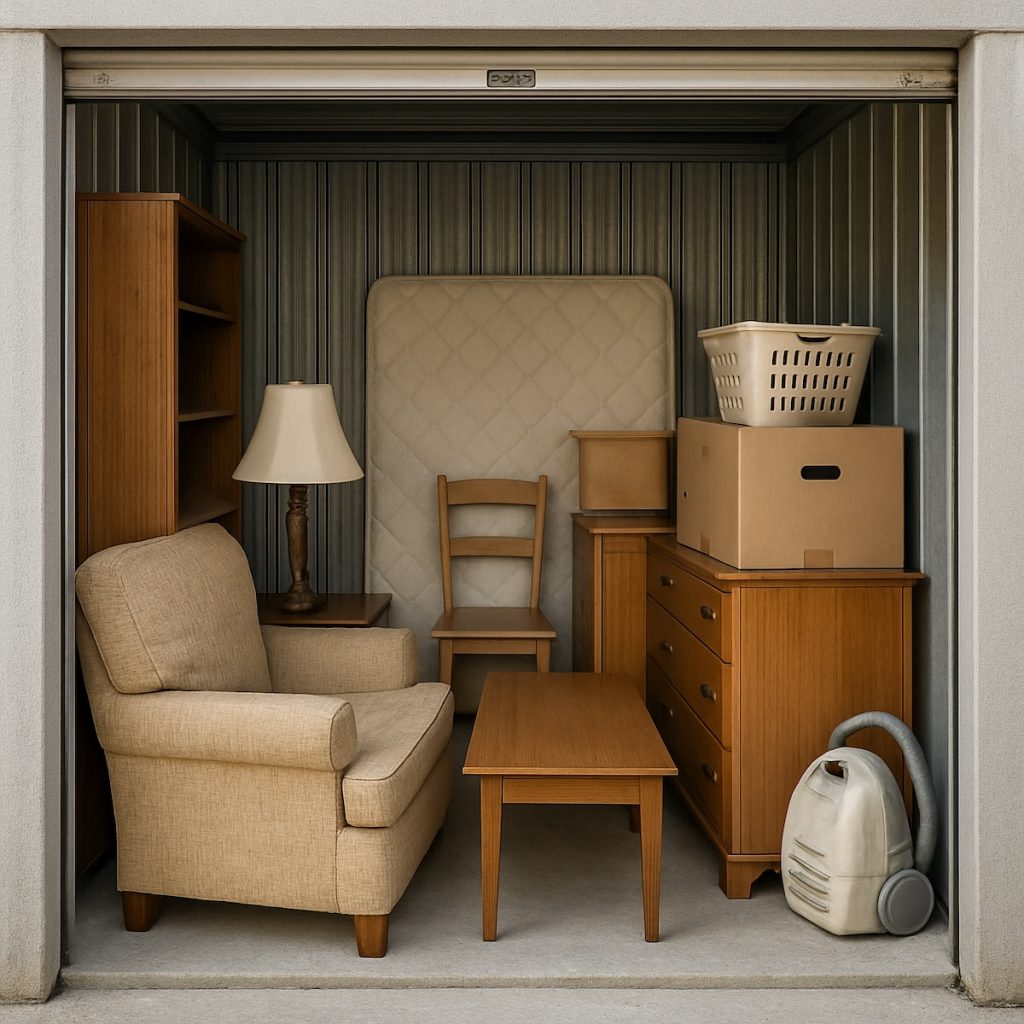
Can You Live In A Storage Unit?
Wondering whether you can legally live in a storage unit? Find out everything you need to know in this guide, including the laws in place, considerations, and potential repercussions of making a storage unit your home.
Can I live in a storage unit?
No, you can’t live in a storage unit, and it’s illegal throughout the US. While some people think that it’s a good way to save money and ensure security, there are many reasons why it isn’t a viable solution, including safety and legal reasons.
Why do some people think living in self-storage units is a good idea?
With the increased cost of living, high housing demands, and problems with homelessness, it may seem like a cost-effective solution. Here are some of the most common reasons as to why people consider setting up home in their storage facility.
Increased housing costs
Many of the most popular US cities are experiencing massive rent increases, where even studio apartments can cost thousands of dollars per month. For example, Zillow lists the average monthly cost of rent as $2,100, highlighting an ongoing issue.
People with minimum-wage jobs or other financial commitments are finding it increasingly difficult to afford rent, leading many to seek alternate housing options.
Homelessness
There are many reasons why a person may become homeless, including being unable to afford accommodation, losing their jobs, complex divorces, and escaping domestic violence.
Storage units can seem like an ideal solution to avoid living on the street, but they pose legal issues and come with safety concerns.
Security and privacy
Nobody wants to sleep on the street, and storage units are more secure. They also offer a locked door and protection from the elements, which might seem like a huge step up for someone facing the prospect of sleeping rough.
Is it legal to live in a storage unit?
No, living in a storage unit isn’t legal, and doing so could result in legal repercussions. While each state makes its own laws, in this case, living in storage units is prohibited across all 50 states.
You’re probably wondering why is it illegal to live in a storage unit, so let’s take a look at the many laws and the reasons for their existence.

Zoning laws
According to zoning laws, a storage facility isn’t classified as a residential unit, as most are located in industrial or commercial areas. So, because your unit is in a commercial or industrial zone, it isn’t suitable for residential use.
Health and safety codes
Health and safety codes ensure that all residential dwellings are up to code. These laws include stipulations such as adequate heating, proper ventilation, and plumbing. A storage unit lacks all of these things, which means it’s not safe for residential use.
Occupancy regulations
To be classified as livable, all residential buildings must meet international habitability standards, and storage spaces don’t. You can view more information in the 2021 International Building Code. While each state makes its own laws, most will follow this legislation.
Can you stay in a storage unit temporarily?
No, temporary stays—even overnight—are illegal, and your storage rental agreement will usually explicitly state this. Most facilities have security cameras and surveillance, which means it’s hard to seek shelter in the unit without people noticing.
Some people think it’s fine to sleep in a storage unit while using public bathrooms and gyms, but there’s always a risk of getting caught. When this happens, you could face a range of repercussions.
What happens when you’re caught living in a storage unit?
A storage facility might seem like a cheap place to stay, but you’ll face a range of legal consequences if you choose to do it. These consequences can range from immediate to long-term:
- Immediate Repercussions: The storage provider will probably evict you from the unit, and you could be banned from renting from the company again. In some cases, you could also face misdemeanor charges and fines.
- Long-term Repercussions: If you face civil charges, they could appear on your criminal record, making it challenging to rent units elsewhere.
Remember, living in storage unit facilities may seem like a temporary fix, but it can result in lasting damage.
What if the facility rents units as residential housing?
Unfortunately, storage facilities that aren’t reputable may try to make extra money by offering people with limited accommodation options the chance to rent a unit for residential use. However, this is against the law, and the facility will face serious legal repercussions:
- Violating Zoning Laws: The owners will be held accountable if a facility violates zoning laws. According to LegalMatch, potential penalties include court action, financial damage, and denial of future permits.
- Building Code Violations: The penalties for violating building codes depend on the state, including fines over $10,000, civil lawsuits, and loss of permits.
- Health and Safety Department: Local health departments may also intervene and potentially declare the facility a public nuisance.
- Insurance Issues: If a facility allows people to live in the units, its insurance policy will be voided, and it will be hard to find another provider.
- Lawsuits: If a tenant faces injuries or even death from living in a storage facility, the owner could face lawsuits.
The safety risks of living in a storage facility
Now that we’ve covered why you can’t live in a storage unit, it’s time to reveal why you shouldn’t even entertain the idea. Units can pose severe health and safety issues for occupants because they’re not designed for residential use.
Lack of ventilation and temperature control
Standard storage units don’t have insulation, and they can suffer extreme temperature changes. During the summer, the unit might overheat and reach temperatures over 100°F, while winter can expose you to freezing temperatures.
Even a climate-controlled storage unit has limited ventilation, which can lead to potential health complications.
Sanitation problems
Storage units aren’t designed for living, so you won’t have access to basic sanitation, including running water, toilets, showers, and sinks. Not only will this impact personal hygiene, but it can also lead to immediate eviction, as the facility staff are likely to notice.
Security issues
Although storage unit doors have locks, there’s still a risk that they might be broken into. Long-term facilities with limited access can also increase the risk of being locked inside for the long term, which is potentially life-threatening.
Electricity hazards
Storage facilities are designed to keep your belongings safe, not act as accommodation. If you decide to use cooking equipment, heaters, and other electrical items, the risks of fires and carbon monoxide poisoning increase.
So, what can you use a storage unit for?
While you can’t live in storage units, they can provide vital support if you need extra space or are currently without stable accommodation. For example, if you’re in between homes or have to rent a small apartment, you can use storage units for the following purposes:
- Valuable Belongings: Storage units can keep your personal belongings, including antiques, electrical equipment, and personal items, safe. Opting for a climate-controlled facility will give you added peace of mind.
- Vehicles: There are a range of car and boat storage options available, including outdoor, covered, and indoor units.
- Business Storage: If you ran a business out of your home or had to downsize, you can rent a business storage unit for your equipment.

Real-Life Cases: People Who Tried to Live in Storage Units
Can you live inside a storage unit? Other people have asked the question and ignored the law. Unfortunately, these people soon discovered that the long-term implications of making their storage facility a
Unfortunately, stories about people caught living in storage units are not uncommon. Here are just a few examples:
Couple living in a storage facility
A couple posted a video on TikTok showing their life in a storage unit. After being unable to find affordable accommodation, they turned a climate-controlled unit into their home. However, after the video went viral, they were kicked out of the unit.
Michigan storage unit death
An individual let a homeless woman stay in their storage unit and locked her in. Unfortunately, a fire broke out, and the woman was killed as she was unable to escape. While the judge dismissed manslaughter charges, this case highlights the ongoing risks of using units as accommodation.
Children living in a storage unit
A father in Kansas faced multiple charges after living with his young children in a storage unit. The children didn’t have diapers or food, and the father faced charges. His case was also referred to child protective services.
The bottom line
Living in a self-storage unit is illegal and carries a range of health and safety risks. While it may seem tempting and an easy way to save money, there are safer, legal options available for people without accommodation.
Storage units protect personal property, and any reputable facility will have strict contracts that prohibit renters from living in them. If you’re looking for a responsible storage facility, FindStorageFast is your go-to resource.
Use our website today to find the perfect units in your area.
FAQs
Can you live in a storage unit in California?
No, you can’t. While California is known for being laid-back, it’s still illegal to make a storage unit your home. The state strictly prohibits it due to zoning laws and safety concerns.
What are the alternatives to living in a storage unit?
There are plenty of alternatives to explore, including:
- Shelters: Most cities have a range of emergency shelters available for people without accommodation. Shelters can also help you find more permanent solutions.
- Transitional Houses: There’s also an option to explore transitional housing programs, which can help you find a job and mental health support.
- Family and Friends: Sometimes, the best option is to speak to family and friends, as they might be able to give you a place to stay.
- Car Living: Cars can be temporary shelters, and some states allow people to sleep in cars as long as they’re not illegally parked.
How do storage facilities catch people living in storage units?
Storage facilities have security in place, including CCTV and motion sensors. Many facilities also have night staff who walk through the building each evening to check for security issues. Temperature controls and access logs may also indicate whether someone is living in the unit.
Why is it against the law to live in a storage unit?
It’s against the law to live in a storage unit for obvious reasons, including federal housing laws, the fact that they weren’t built for human habitation, and potential safety laws. The possible repercussions aren’t worth the short-term accommodation.

